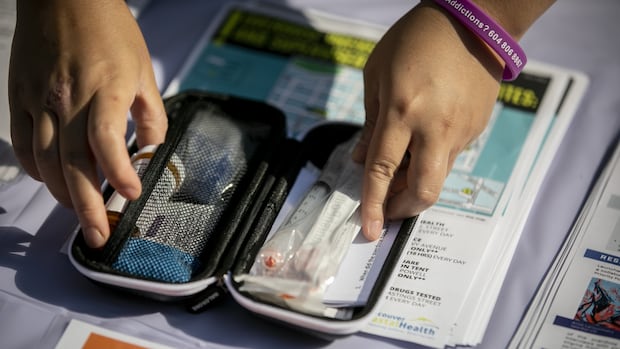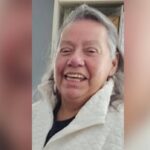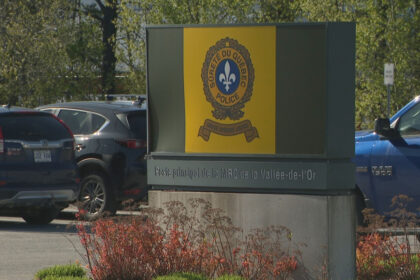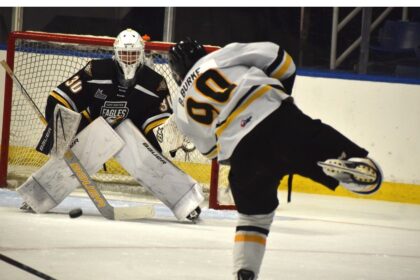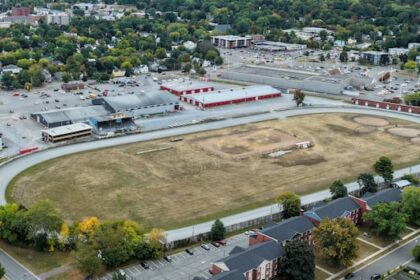ManitobaAn Indigenous-led clinic bringing substance addiction services to Manitoba’s Island Lake region has already enrolled 15 patients in treatment for opioid dependency — but officials warn the need for these services is dire and dozens are already sitting on a waitlist. New program brings care to those in Island Lake region, so they don’t need to leave home to get treatmentA file picture of an outreach worker holds a naloxone kit. Manitoba Anisininew Mobile Addiction Network clinic received funding in April to offer substance addiction services like prescriptions, harm-reduction and treatment referrals for residents from Manitoba’s Island Lake region in their home communities. (Ben Nelms/CBC)An Indigenous-led clinic bringing substance addiction services to Manitoba’s Island Lake region has already enrolled 15 patients in treatment for opioid dependency — but officials warn the need for these services is dire and dozens are already sitting on a waitlist. “This is opening up the doors for people who are not able to access services in the city,” said Kirsty Muller, addictions service program manager at the Manitoba Anisininew Mobile Addiction Network clinic, which had its official opening Monday.”Unfortunately we were having to turn away people at our clinics that walk in wanting to access services because we just don’t have the capacity to be able to see everyone we have.” In April, the clinic was created to offer substance addiction services like prescriptions, harm-reduction and treatment referrals for residents from Garden Hill, St. Theresa Point, Red Sucker Lake and Wasagamack First Nations. It received funding from the Four Arrows Regional Health AuthorityThe clinic planned to offer addiction services to residents from those communities who are in Winnipeg — but also bring substance abuse treatment options directly to the Island Lake region, so residents don’t have to travel away from home to get the care that they need, Muller said. Kirsty Muller, addictions service program manager at the Manitoba Anisininew Mobile Addiction Network clinic, says the clinic made its first visits to Island Lake Region in September where they enrolled 15 residents from Garden Hill First Nation in addictions treatment. (Justin Fraser/CBC)”That’s been life-changing and life-saving for people in the community,” she said at an opening ceremony for the clinic in Winnipeg on Monday. “We’re able to see more patients and get people onto the program a lot quicker doing that way.” The clinic already had a presence in Red Sucker Lake First Nation, where nurses provided addiction treatment services for residents coming out of the COVID-19 pandemic. After receiving the funding, the clinic framed its policies and stocked up in Winnipeg by the summer. But plans to visit the Island Lake region were halted after wildfires forced residents out of their homes for weeks.Muller said that while residents returned home, the clinic worked with the province to visit congregate shelters and hotels in Winnipeg where evacuees stayed, and provided harm reduction supplies. They also gave displaced residents directions for treatment services like medical detox and getting some initiated on suboxone, a prescription medicine to treat opioid addiction. Once evacuation orders were lifted, the clinic sent its first team to Garden Hill First Nation, and visited the remote fly-in community located about 475 kilometres northeast of Winnipeg twice in September. ‘We owe it to those who have lost’Muller said up to 60 people were put on a waitlist to receive treatment in Garden Hill, and about 15 people received their first suboxone injection in the community, marking the start of their treatment to manage opioid withdrawal symptoms and reduce cravings. Muller said a doctor will continue visiting Red Sucker Lake First Nation once a month to ensure patients can still receive or continue treatment. Meanwhile, another visit to Garden Hill is planned for Tuesday while the clinic makes plans to visit Wasagamack and St. Theresa Point First Nations in the coming months. Councillor Vernon Monias from St. Theresa Point First Nation said drug addiction is particularly impacting youth in the community located around 425 kilometres northeast of Winnipeg.Wasagamack First Nation Health Director Ian Knott said in his community, located about 470 kilometres northeast of Winnipeg, different generations are bearing the brunt of substance use and addiction.Services for those struggling with addiction are scarce in Manitoba, despite the demand for them, said Assembly of Manitoba Chiefs Grand Chief Kyra Wilson, who commended the clinic’s approach to filling a gap in the system by providing culturally appropriate support to battle this issue.The Manitoba Anisininew Mobile Addiction Network clinic will offer addiction treatment services to residents from Garden Hill, St. Theresa Point, Red Sucker Lake and Wasagamack First Nations living in their Winnipeg facility on Ellice Avenue. (Justin Fraser/CBC)”I just think about my own family, the struggles [it] has had to deal with when it comes to addictions … this is definitely a step in the right direction and a beautiful direction,” Wilson said. Laurie Wood Ducharme, director of administration at Four Arrows Regional Health Authority, said drug addiction in the Island Lake region is a crisis that demands the same urgency and unity that came through in fighting COVID-19. “Mental health and addictions do not discriminate … in the Island Lake region and across Manitoba too many funerals, too many families torn apart, and too many of our young people lost,” she said.”We owe it to those who have lost. We owe it to the generations yet to come.” Muller said the clinic is likely going to need more support and staff, especially as more residents hear about their programming.Funding up to this point has been provided by the Four Arrows Regional Health Authority, Muller said, hopeful the province and the federal government will also get onboard to support the clinic economically. “We’ve proven that success is there,” she said. “We’ve already done two visits to Garden Hill and seen quite a turnout and quite a need.”New addictions clinic offers treatment in remote Manitoba communitiesA new clinic will serve as a hub for people from four northern First Nation communities where mental health and addictions concerns are front and centre. The Manitoba Anisininew Mobile Action Network clinic offers accessible treatment to those who face barriers when trying to get help.ABOUT THE AUTHORSantiago Arias Orozco is a journalist with CBC Manitoba currently based in Winnipeg. He previously worked for CBC Toronto and the Toronto Star. You can reach him at santiago.arias.orozco@cbc.ca.
Wednesday, 4 Mar 2026
Canada – The Illusion
Search
Have an existing account?
Sign In
© 2022 Foxiz News Network. Ruby Design Company. All Rights Reserved.
You May also Like
- More News:
- history
- Standing Bear Network
- John Gonzalez
- ᐊᔭᐦᑊ ayahp — It happened
- Creation
- Beneath the Water
- Olympic gold medal
- Jim Thorpe
- type O blood
- the bringer of life
- Raven
- Wás’agi
- NoiseCat
- 'Sugarcane'
- The rivers still sing
- ᑲᓂᐸᐏᐟ ᒪᐢᑿ
- ᐅᑳᐤ okâw — We remember
- ᐊᓂᓈᐯᐃᐧᐣ aninâpêwin — Truth
- This is what it means to be human.
- Nokoma


